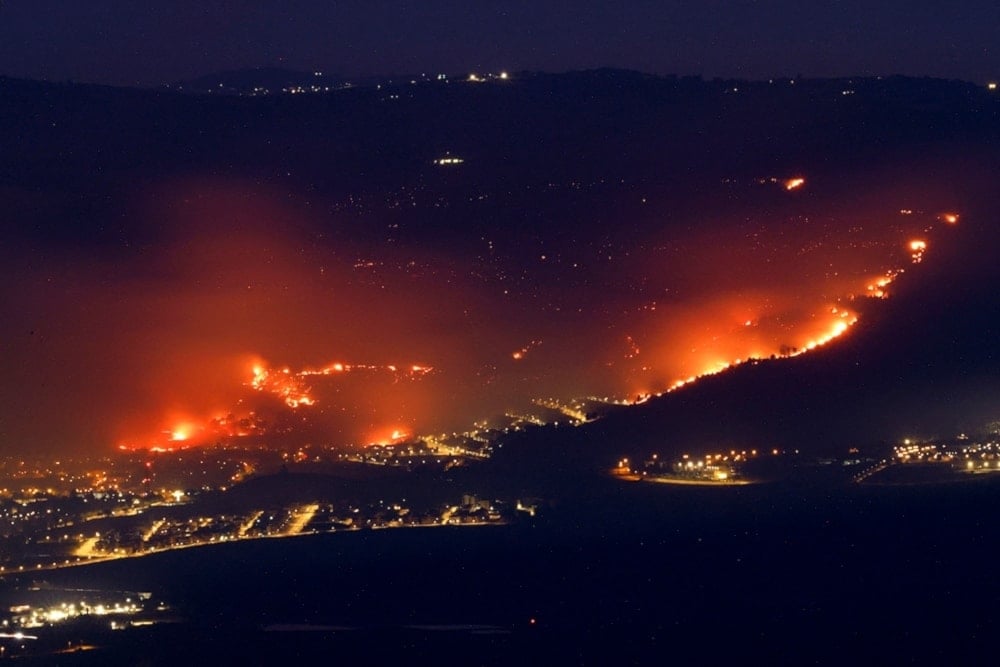War with Hezbollah would be 'nightmare scenario' for Israeli economy
The Economist reports that clients of the three largest Israeli banks have recorded a sharp increase in clients requesting to transfer their savings abroad.
-

Fires burn as a result of rockets and drones launched by the Resistance Lebanon toward Israeli settlements in northern occupied Palestine, on June 3, 2024. (AFP)
In a recent analysis, The Economist highlighted that a full-scale war between "Israel" and Hezbollah represents a "nightmare scenario" for the former's economy, with a number of investors already preparing for a war that would "engulf Israel".
According to the report, such a war would severely damage Israeli economic growth, possibly even more than the impact of the Palestinian Resistance's October 7 operation.
Read more: 'Israel' no longer top destination for millionaires
A war-time economy is precarious, requiring a government to finance its military, usually through deficit spending, while maintaining enough economic strength to manage post-war debts, the report added.
However, the most alarming scenario today facing the occupation entity is that the war would extend into its key commercial centers, including Tel Aviv. Even a more limited military escalation in the northern regions could push the Israeli economy to the brink, it warned.
Military expenditures are expected to rise significantly, placing further strain on the entity's financial resources.
Adding to these challenges, Israeli banks are facing a substantial outflow of capital, as investors seek to move their funds abroad.
The three largest banks in "Israel" have reported a sharp increase in the number of clients requesting to transfer their savings abroad.
Read more: One year into war on Gaza, 'Israel' grapples with upper echelon exodus
This development has heightened concerns among the entity's economic policymakers, who are now more worried than they were at the outset of the war.
Even the Israeli Finance Minister is offering a gloomy outlook, “We are in the longest and most expensive war in Israel’s history.”
"Previous conflicts have ended in economic disaster for Israel. Do not be surprised if this one does, too," the report concluded.
Qader 1
In response to the ongoing Israeli aggression Lebanon launched on Monday, which has so far resulted in the killing of around 560 people and the wounding of more than 1,800 others, Hezbollah upscaled its operations in the past few days.
Including in its recent statements the phrase "in defense of Lebanon," the Resistance group launched strikes on key Israeli military bases and settlements, expanding the scope of its operations. This escalation led to an increased fleeing of Israelis from northern settlements and forced businesses in the region to close or suspend operations.
For the first time ever, the Resistance targeted on Wednesday the suburb of Tel Aviv, forcing hundreds of thousands of settlers to shelters.
Hezbollah unveiled in a statement the Qader 1 ballistic missile, announcing that it was used to strike the Mossad command center responsible for the pagers and two-way radios terrorist attack and the assassination of the Resistance group's leaders.
The command center is based in the suburbs of Tel Aviv, Hezbollah confirmed in its statement.
'Dying out one after the other'
The Israeli economy had already shown major signs of weakness before October 7, but the situation was exacerbated when Operation Al-Aqsa Flood and the subsequent genocidal war crashed the occupation.
During the fourth quarter of 2023, the Israeli GDP contracted by 21%. Despite making a 14% recovery in the first quarter of 2024, growth slowed and stood at 0.7% for the second quarter, prompting economists such as Jacques Bendelac to warn of possible recession if the war does not soon cease.
In this context, Fitch Ratings, a capital market company, forecasted in August that the Gaza war—now the longest since 1948—could potentially extend into 2025. Israeli economy also faces the threat of a multi-front war as aggression on the northern front with Lebanon escalates.
Three major ratings agencies, including Fitch, downgraded Israeli debt, possibly indicating that "Israel" could not close off its obligations, although credit ratings still remained high.
"Israel's" primary growth sectors are technology and the arms industry, both of which were exempt from the risks of war to a certain extent. However, other key areas such as tourism, construction, and agriculture were dealt heavy blows and are "dying out one after the other," Bendelec said.

 4 Min Read
4 Min Read








